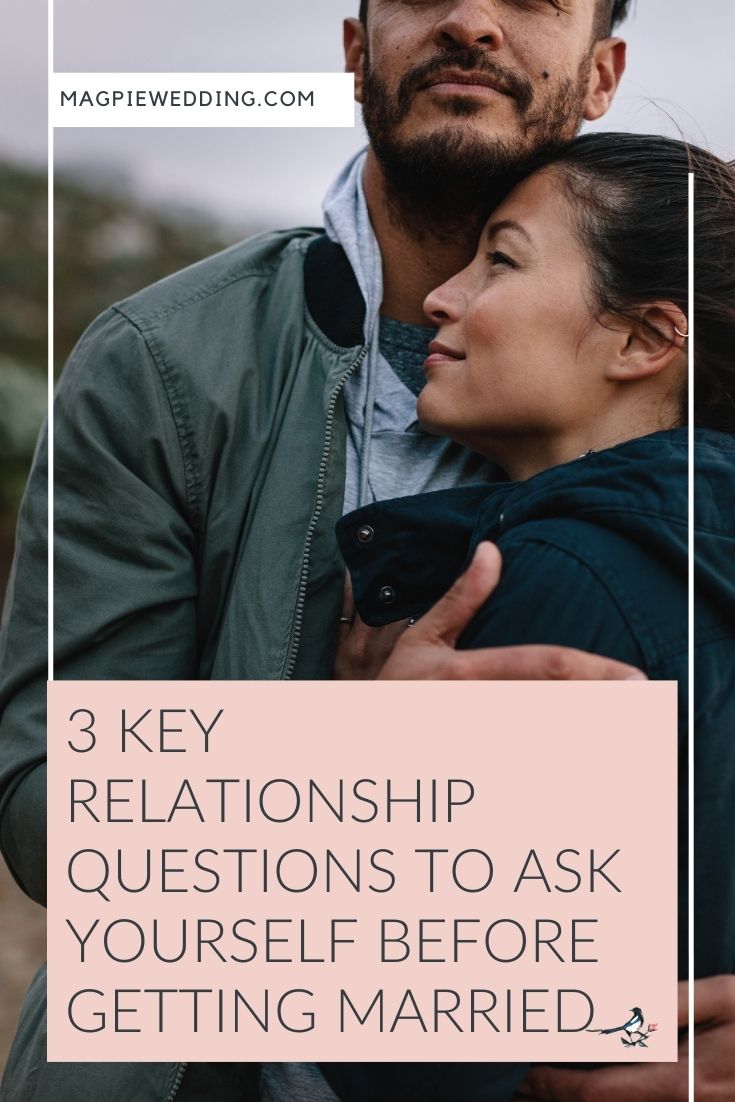Marriage is one of the most significant commitments you’ll make in your life. You’re about to enter into a lifelong partnership where love, respect, and understanding are at the core. However, before saying “I do,” it’s essential to ask yourself some hard-hitting relationship questions to ensure you’re both emotionally, mentally, and practically prepared for the road ahead.
The fact is, marriages require effort, and this reality is becoming increasingly recognised. Perhaps it’s one reason that marriage rates have been dropping since the 70s and are at the lowest rate today.
If you’re about to pop the question or think your partner is about to, here are three critical relationship questions to consider before anything else.

1. Am I Ignoring Any Red Flags?
Marriage is a lifelong commitment, but it should never come at the cost of your safety, well-being, or self-worth. While every relationship faces challenges, there are certain situations where walking away becomes not only an option but a necessity. Surprisingly, this can be a tough decision because other aspects of your relationship might seem picture-perfect.
However, abuse–whether it be physical or emotional– is one red flag that should never be ignored. Learn to recognise the signs early and have the courage to call it quits to save yourself from further harm.
The American Association for Marriage and Family Therapy states that couples often excuse early aggressive incidents and believe that any violence is temporary. They note that one of the most common types of abuse is characterised by coercion and control. Sometimes, this can escalate to the point where your kids are threatened or harmed.
If you end up in such a situation, sometimes, only the threat of legal action can yield results. That might mean hiring a personal injury lawyer after your partner becomes physically violent with you. This ensures you have legal protection and your partner is well aware of the consequences if he or she persists in any abuse.
TorHoerman Law notes that abuse isn’t physical, even mental and emotional trauma can be grounds to lawyer up. So, take a few moments to really think about your relationship and if you have been ignoring any red flags or signs that could escalate after marriage.

2. How Do We Each Define Intimacy and Affection?
Intimacy and affection are fundamental to the success of any marriage, yet they are often misunderstood or taken for granted. Before getting married, it’s essential to explore how both you and your partner define and express intimacy and affection.
If you thought that dead bedrooms were a problem for the older generation, think again. The BBC notes that many millennials are increasingly reporting dry spells in the bedroom. Sex therapist Stephen Snyder told BBC Worklife that he generally classifies sexless as four times a year or less.
However, intimacy, or its lack is something unique to each relationship. One partner may need more physical touch to feel loved and secure, while the other may need less. This difference doesn’t mean one person’s need is right and the other’s is wrong. You just have to find a balance and be respectful of each other’s boundaries.
Similarly, don’t forget about affection, which is the tangible expression of love and care. While intimacy focuses on connection, affection is about how you show that connection outwardly. For some, affection might mean thoughtful gestures like leaving sweet notes or planning surprise dates.
For others, affection might look like verbal affirmations or making time for their partner on a busy day. Affection may also involve non-verbal communication, like a reassuring glance or a gentle touch when you’re together in a crowd. There are no questions about this one. You have to think about and discuss how you and your partner are going to handle intimacy and affection in the future.

3. How Well Do We Know Each Other’s Family and Friends?
We’ve all heard the saying that when you marry someone, you’re not just marrying them- you’re marrying their family and friends, too. It’s almost a cliché at this point, but the relationships you have with your in-laws can significantly influence your marriage. Thus, it’s important to give this some thought.
According to Gary Giles, an LCPC writing for MentalHealth.com, relationships with in-laws are one of the most common problem areas for newlyweds. He ranks it up there with problems related to money and sex.
So, start by thinking about your partner’s family dynamics. Do you get along with their parents, siblings, and extended family? Are there any unresolved conflicts or challenges that could affect your relationship after marriage?
Try to understand each other’s family history and how relationships may impact your lives together. Family traditions, expectations, and obligations will likely come into play as your marriage progresses. Thus, knowing how to navigate these dynamics with respect and understanding will help prevent tension later on.
The same goes for friends. Are your closest friends supportive of your relationship? How well do they know your partner? Healthy relationships with friends can act as a positive support system for your marriage, but if there are tensions or conflicts between your friends and your partner, it could create unnecessary stress.
Having a conversation with your partner about family expectations and friendships will help set boundaries and clarify any concerns you may have.

Frequently Asked Questions
1. What is a silent red flag in a relationship?
A silent red flag is a subtle behavior that indicates deeper issues, like consistent emotional unavailability, dismissive communication, or avoidance of conflict. These signs may go unnoticed initially but can erode trust and connection over time. Awareness and open communication are vital to addressing such concerns early.
2. Can my marriage last without intimacy?
While some marriages endure without physical intimacy, a lack of intimacy can strain the relationnship if unmet needs arise. Open communication, counseling, or redefining intimacy beyond the physical can help maintain connection and satisfaction in such situations.
3. How to deal with in-laws after marriage?
Building a healthy relationship with in-laws involves mutual respect, clear boundaries, and open communication. Try to prioritize your spouse’s support to navigate conflicts diplomatically. Remember to show understanding while asserting your needs and remember that patience and compromise are essential to long-term family relationships.
All things considered, a proposal can be a dream come true experience for many people. However, even though it may be a joyous moment, you have to remember that this is a major life decision. Choosing who you commit to, choose to have children with, or buy a home together with are not decisions you take lightly.
You might be tempted to say “Yes” at that moment, but you ought to consider all these aspects well in advance of any proposal. That way, you can enjoy the moment wholeheartedly since you’ve already vetted your partner as spouse-material!

This is a collaborative post




